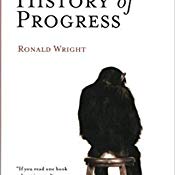The idea of progress is a relatively knew idea within the history of humans. The idea of progress is fundamental to the ideas of Capitalism and economic growth. Many Americans blindly believe that of progress, economic growth, and Capitalism are leading to the betterment of humans. If one carefully reads the IPCC's Fifth Assessment Report, it states that CO2 (and other greenhouse gasses) emissions are driving global warming and thus climate change. That report also says that economic growth and population growth are driving those emissions.
Climate change is one of the "progress traps" Wright is talking about. Progress does not inexorably lead to the betterment of humans. Nor do growth economies, including Capitalism. Wright helps readers see the big pictures of how humans have interacted with the Earth in ways that destroy civilizations and threatens to ruin our host, Earth.
The Myth of Progress by Tom Wessells is another good book about progress.
Amazon.com Review
No hope, just an awareness of what's being done now and what's been done in the past, is what Ronald Wright will permit in A Short History of Progress, his grim, ammoniacal Massey Lectures, the 43rd in the series. In five lucid, meticulously documented essays, Wright traces the rise and plummet of four regional civilizations--those of Sumer, Rome, Easter Island, and the Maya--and judges that most, perhaps all, of humanity is making and will continue to make mistakes equally disastrous as theirs. He gives general reasons first for not reckoning we'll pull back from the brink. Important among them is an anthropological observation. As individuals, we live long lives. We evolve more slowly than we should, given our lack of vision and our aggressive, selfish nature. We seem to lack the collective wisdom and the insight into cause and effect to realize the limits to what Wright calls the "experiment" of civilization. What Wright calls natural "subsidies" underwrite civilizations' successes. The squandering of those gifts presages inevitable failure, but with careful, canny stewardship, a civilization can manage to muddle through eons. Wright cites Egypt's submission to the limits set by the Nile's annual floods and China's windblown "lump-sum deposit" of topsoil, used for hillside paddies instead of being put to the plough. Wright observes with unrelenting eloquence that our planetary civilization lives precariously, far beyond its means. "Hope drives us to invent new fixes for old messes," he acknowledges, neither claiming nor wanting to be a prophet. We certainly have the tools for change and remediation; we also know what our ancestors did wrong and what happened to them. We're faced, our author observes, with two choices: either do nothing--what he calls "one of the biggest mistakes"--or try to effect "the transition from short-term to long-term thinking." His evidence suggests we're taking the first alternative, which will include a swift, final ride into the dark future on the runaway train of progress. Wright's account tempts one to bet on the rats and roaches. --Ted Whittaker
From Publishers Weekly
Progress can do us in, or so argues British historian Wright as he embarks on a lively if meandering journey through the development and demise of ancient civilizations to determine whether our current one is doomed. By reading the "black boxes" left by departed societies (like those of the Easter Islanders, the Sumerians and the Mayans), we can learn to avoid the mistakes that led to their downfall, he suggests. Many of those errors revolve around the plundering of natural resources and the development of social hierarchies that allow elite groups to indulge in over-consumption at the expense of the masses. Other errors involve "progress traps," technologies or advances that, like weapons, are initially useful but become dangerous to civilization once fully developed, especially if moral and technical progress diverge. The analogy of civilization as a kind a "pyramid scheme," which, like the sales scheme, thrives only if it grows, is one of several imaginative mnemonic devices Wright uses to round out his argument. Today's culprit, he declares, is "market extremism," which has "cross-bred with evangelical messianism to fight intelligent policy on metaphysical grounds." This laissez-faire capitalism, he reasons, will spell the end of the planet, and our civilization, if it is not controlled. Wright crafts an entertaining tale of eras gone by, incorporating relevant facts on subjects as diverse as the lifestyles of early hominids and recent patterns of climate change, and demonstrating the holistic importance of natural resources to a society. And if he never specifies exactly what the proper choices for modern civilization are, or how they will bring deliverance from the coming storm, his book will nonetheless convince readers that we are at a crossroads where the right choices can still be made.
Copyright © Reed Business Information, a division of Reed Elsevier Inc. All rights reserved.
Copyright © Reed Business Information, a division of Reed Elsevier Inc. All rights reserved.



![A Short History of Progress by [Wright, Ronald]](https://web.archive.org./web/20200117150318im_/https://images-na.ssl-images-amazon.com/images/I/41CwOO9OYDL._SY346_.jpg)



















